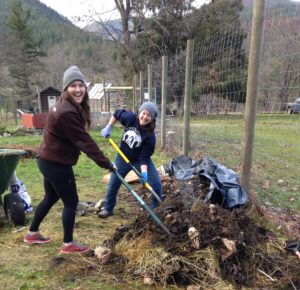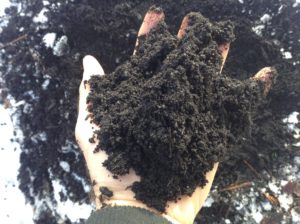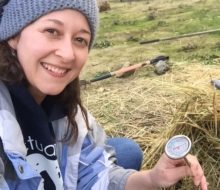Part of our Sanctuary One focus is working in connection with the earth, which we do through our care for trees, land, and gardens. Our Learning Garden provides produce for our livestock and local food banks, connecting the earth to our animal and people aspects of our mission. Our gardening philosophy is permaculture inspired. Along those lines we use the materials around the farm to create a healthy living compost, which in turn, nourishes our Learning Garden. In today’s post we want to focus on composting.
Composting is a simple and cost effective way to create nutrient rich soil for your home garden, but did you know that there are even more benefits to having a compost pile in your yard? Here are a few reasons:
- Enriched soil holds more moisture which can help to prevent plant diseases and pests.
- Creating your own enriched soil reduces the need for chemical fertilizers.
- Composting kitchen and yard waste helps to reduce methane emissions from landfills and therefore reduces your carbon footprint!
 There is no hard fast rule when it comes to turning your compost because the timing depends on the temperature and humidity of your area. It’s best to leave your new compost pile alone while the center of the pile heats up and reaches a temperature of 130°F (54°C). You can purchase a compost thermometer at your local garden and hardware store or watch for steam coming off the top of the pile, indicating that the center of the pile has reached the optimal temperature. This process can take between 4-10 days depending on the weather.
There is no hard fast rule when it comes to turning your compost because the timing depends on the temperature and humidity of your area. It’s best to leave your new compost pile alone while the center of the pile heats up and reaches a temperature of 130°F (54°C). You can purchase a compost thermometer at your local garden and hardware store or watch for steam coming off the top of the pile, indicating that the center of the pile has reached the optimal temperature. This process can take between 4-10 days depending on the weather.
Two to four days after the center of the pile has reached 130°F (54°C) the temperature will naturally begin to drop down to 100° indicating that it’s time to turn your pile for the first time. Turning the pile will bring the temperature in the center back up to 130°F (54°C) and this should be repeated every 4-7 days. When turning your compost it’s important to move materials from the outside of the pile into the center where the beneficial fungi and bacteria can break it down. Read the OSU extension publication on compost for more info on compost variables that affect how quickly it will be ready for use in the garden.
 Finished compost can take between 4-8 weeks or even 2-3 months to make depending on how often you turn the pile, how humid it is and if you’re adding new material to the compost. You can tell when you compost is finished when it stops heating up, looks like dark brown soil, there are no distinguishable parts and it has an earthy smell. Curing your compost is important to allow insects, microarthropods, red compost worms, and beneficial fungi to re-enter the pile, resulting in a finer breakdown of materials. To cure your compost, turn your pile for the last time directly on the earth, sprinkle it with water, cover it with a tarp and let it sit for at least a few weeks or up to 3 months. There is no exact science to hot composting but there are many proven methods to try out and see what works best for your area and your needs. Read the OSU extension publication on compost systems to learn more about commonly practiced methods.
Finished compost can take between 4-8 weeks or even 2-3 months to make depending on how often you turn the pile, how humid it is and if you’re adding new material to the compost. You can tell when you compost is finished when it stops heating up, looks like dark brown soil, there are no distinguishable parts and it has an earthy smell. Curing your compost is important to allow insects, microarthropods, red compost worms, and beneficial fungi to re-enter the pile, resulting in a finer breakdown of materials. To cure your compost, turn your pile for the last time directly on the earth, sprinkle it with water, cover it with a tarp and let it sit for at least a few weeks or up to 3 months. There is no exact science to hot composting but there are many proven methods to try out and see what works best for your area and your needs. Read the OSU extension publication on compost systems to learn more about commonly practiced methods.
We hope you enjoy the benefits of your own compost creations as much as we do.



